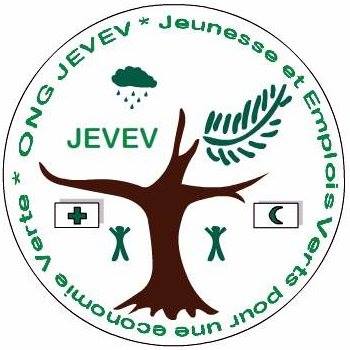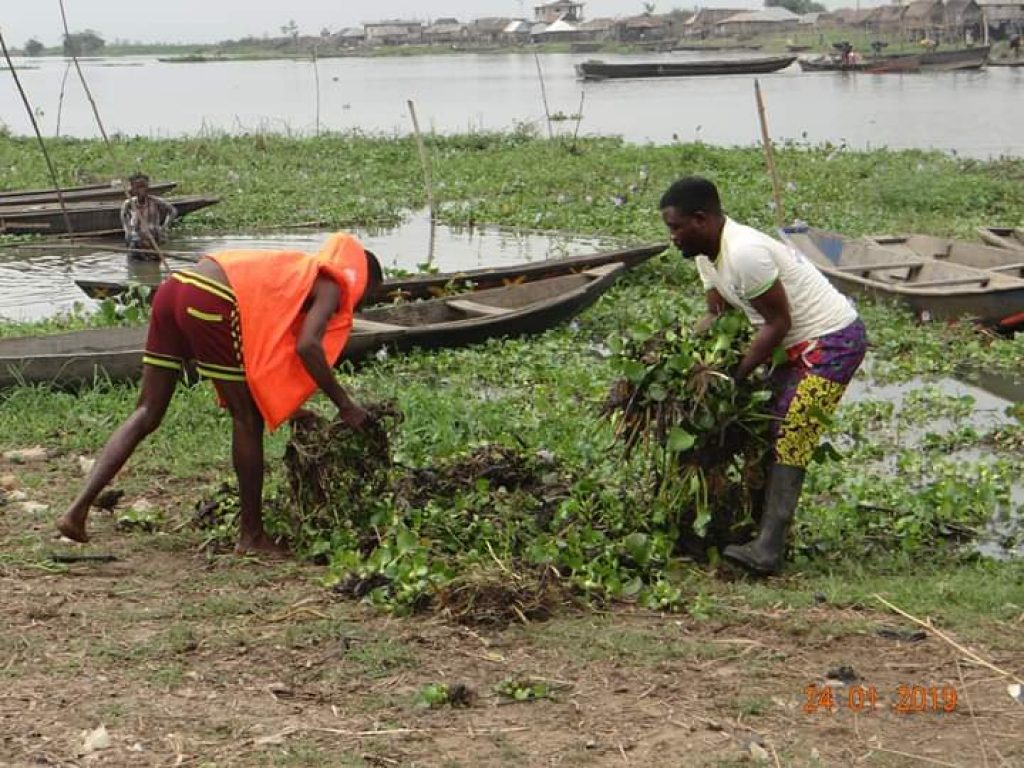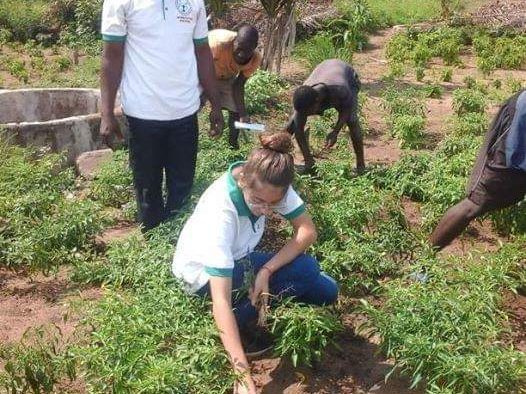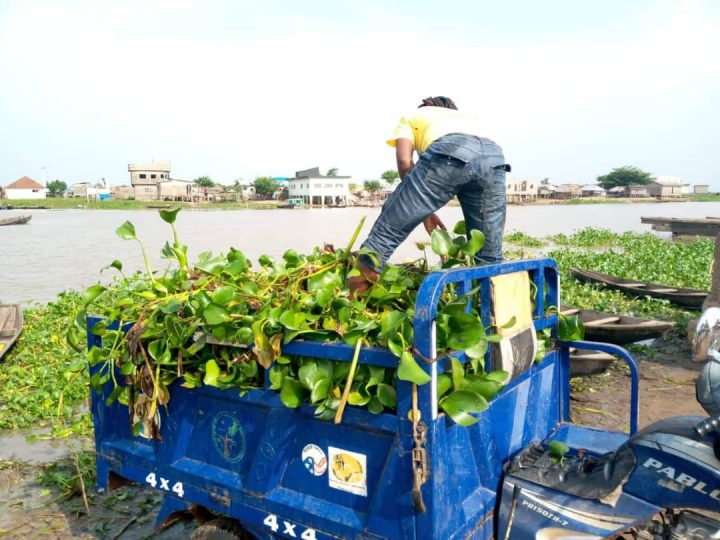
Valorisation of Water Hyacinth in Favour of the Climate
The NGO JEVEV (Jeunesse et Emplois Verts pour une Economie Verte/ Youth and Green Jobs for a Green Economy) wants to turn the problem of water hyacinth invasion, which causes environmental and economic problems, into an opportunity thanks to its transformation into several sustainable products.


Overview of the project
In Benin, the development of water resources remains a major concern due to the anarchic and uncontrolled multiplication of invasive species, including one of the most widespread invasive macrophytes in the world: the water hyacinth (Eichhornia crassipes). In eight months, ten water hyacinth plants can generate 655,330 new plants. The invasion of water bodies by water hyacinth generates multiple negative impacts:
- On biodiversity and the functioning of ecosystems: atmospheric pollution during anaerobic decomposition in the water emits methane, a powerful greenhouse gas (GHG); endangers the lake’s halieutic biodiversity; changes the waters’ physical and chemical properties and the overall environment; increases sedimentation; causes flooding and soil erosion;
- On economic activities: nuisances for fishing (reduction of the presence of fish, obstruction of fishing nets); reduction of income for local populations; threatens agricultural production (obstruction of irrigation canals and the drainage system); and
- On the health of the population: hinders river navigation (reduced navigation possibilities, accidents) and creates a favourable environment for mosquitoes encouraging the development of diseases.
JEVEV has developed an economic channel for the sustainable use of water hyacinths collected by local residents. After several years of research on the invasive species at the Abomey Calavi Ecological Laboratory, the JEVEV team discovered that by combining them with neem cake it is possible to obtain a product capable of naturally enriching the soil, while sustainably keeping harmful insects away. This innovative compost, called Magic Compost, has a dual purpose: it contributes to environmental preservation by reducing the effect of ozone layer depletion caused by agricultural chemical inputs and improves productivity of agricultural areas used for market gardening. This initiative will therefore make it possible to improve hyacinth collection productivity, increase the quantities of compost produced, improve the quantity/quality of market garden produce, and finally increase prices obtained by market gardeners.
The innovative water hyacinth collection and recovery activity has a triple purpose:
- Regeneration of land through transformation into organic fertiliser (compost);
- Promotion of renewable energy via transformation into coal briquettes and organic fertiliser (compost) use; and
- Safeguarding of the aquatic ecosystem and water quality by removal of this invasive species.
Launched in two pilot villages, the initiative has spread to ten villages in the valley and in some forty villages JEVEV also runs sessions to train 140 women and 100 young people in the techniques of making Magic Compost from water hyacinth (through the World Bank’s Framework Programme to Support Agricultural Diversification).
This initiative has already received more than twenty awards at the national, regional and international level, the latest of which was at the COP23 in Bonn, Germany followed by an international competition in Italy.
Finally, thanks to the financial support of Prophetic Economy, the water hyacinth valorisation project has been granted a new component aiming to improve supplying towns’ market garden production by capitalising on the techniques of production and use of water hyacinth compost.
The overall objective is to control the expansion of the biological invasion by water hyacinth and to reduce its consequences in wetlands.
Ongoing research
9/13/2013
- More than 8,500 hectares of market gardens in the lower UEME valley are protected from the abusive use of agricultural chemical inputs.
- 77 communes in Benin use coal as domestic energy
- 45% of households use coal from water hyacinth
- 420 young women and men master the manufacture of coal briquettes
- 700,000 market gardeners, more than 100 women water hyacinth collectors from different communities, dozens of young pirogue collectors and around 100 young men and women processors benefit from the alternatives resulting from the sustainable management of water hyacinth and other services in the processing chain.
- 1,450 producers (cooperative, group) from the commune of Dangbo and So Ava produce compost from water hyacinth
- 3,550 farmers in the villages of the lower Bonou valley, Dangbo, Abjohoun and surrouning communes (including 2,050 market gardeners) use compost instead of chemical inputs
- 15% increase in produce yields
Environmental Impacts:
- Reduction of greenhouse gas emissions
- Flood risk reduction
- Improvement of water quality
- Restoration of plant cover and aquatic fauna through reforestation
- Improvement of aquatic biodiversity
- Reduction of greenhouse gas emissions from the use of chemical fertilisers and pesticides
- Decrease in the use of chemicals and increase in the use of compost
Social Impacts:
- Smooth river navigation
- Resumption of daily activities
- Reduced risk of mortality due to pirogues getting trapped in the water hyacinth
- Integration of a new income-generating activity
Economic Impacts:
- Integration of a growing revenue-generating activity (marketing of organic fertiliser based on water hyacinth)
- Improving the quality and shelf-life of agricultural products
- Improved fishing conditions and expanded fishing grounds
Financed by component 1 of the Agricultural Diversification Support Project - Additional Financing (PADA-AF) for 2018, which planned to train 140 women and 100 young people from the commune of So-Ava on organic fertiliser making techniques based on water hyacinth. Other prizes/awards such as "Dare to Innovate" from the Embassy of the USA in Benin, the University of Abomey Calavi & other partners.
organisation

The NGO JEVEV (Jeunesse et Emplois Verts pour une Economie Verte/Youth and Green Jobs for a Green Economy) aims to place the search for well-being within a human development logic based on a less degraded ecological environment and adapted socio-economic environment. It wishes to contribute to the creation of frameworks conducive to development of the green economy – in particular through the strengthening of innovative green technologies adapted to agriculture – which provides jobs in the context of climate change. In this way, it also helps to raise awareness among local populations about basic sustainable development through social, environmental and health issues.
.




